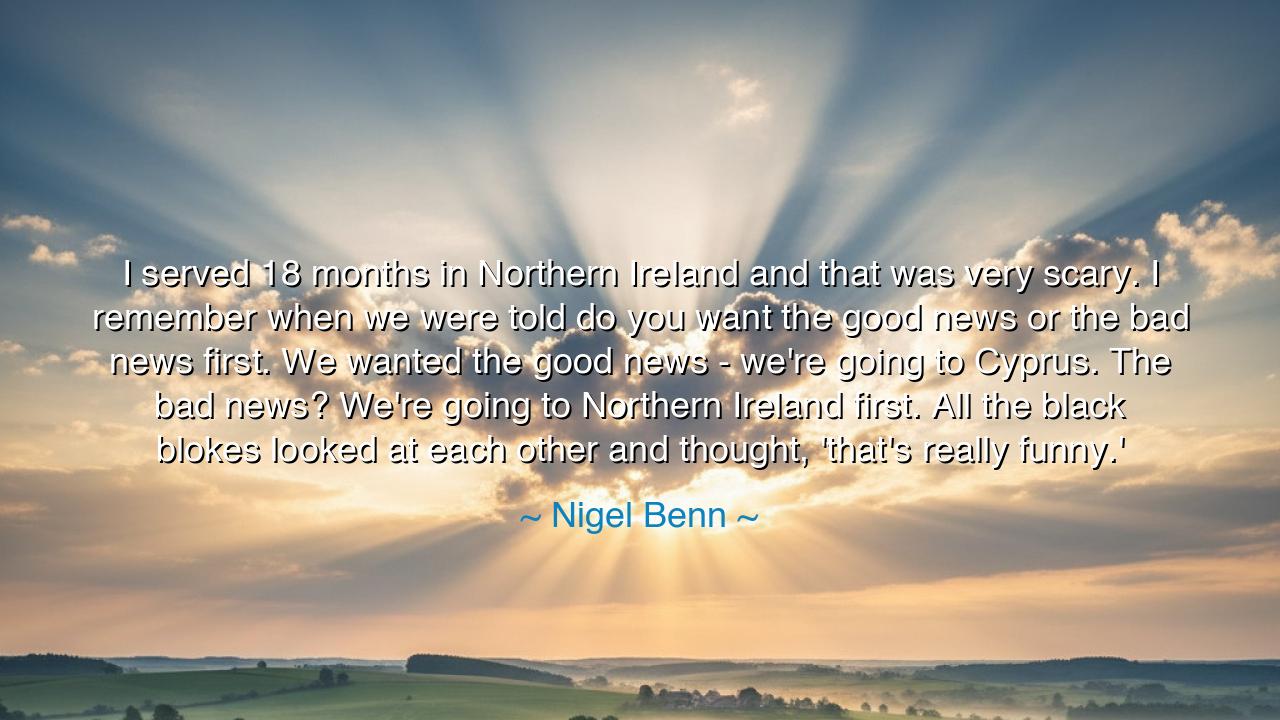
I served 18 months in Northern Ireland and that was very scary. I
I served 18 months in Northern Ireland and that was very scary. I remember when we were told do you want the good news or the bad news first. We wanted the good news - we're going to Cyprus. The bad news? We're going to Northern Ireland first. All the black blokes looked at each other and thought, 'that's really funny.'






“I served 18 months in Northern Ireland and that was very scary. I remember when we were told do you want the good news or the bad news first. We wanted the good news – we’re going to Cyprus. The bad news? We’re going to Northern Ireland first. All the black blokes looked at each other and thought, ‘that’s really funny.’” Thus spoke Nigel Benn, the Dark Destroyer, a warrior of both the ring and the battlefield, whose laughter amid danger reveals a truth both ancient and profound. His words carry the weight of memory and the lightness of humor, forged in the crucible of fear. They teach that even in the face of terror, the human spirit can find the strength to laugh, to endure, and to live.
When Benn recalls his time in Northern Ireland, he speaks of a young man thrust into chaos—a soldier serving in a land torn by conflict and suspicion. The air was thick with danger, and the division between communities mirrored the deeper divisions of the human heart. For a young black soldier in the British Army, the tension carried not only the fear of violence, but the awareness of standing out in a world still burdened by prejudice. Yet Benn and his comrades met this fear not with despair, but with humor, that ancient defense of the human soul. Their laughter—“that’s really funny”—was not mockery, but courage made audible. It was the kind of laughter that defies fear, the sound of men claiming their humanity in a place that threatened to strip it away.
This moment of dark humor echoes through history, for it is an instinct older than language itself. The Spartans, facing death at Thermopylae, joked that they would fight in the shade when told the enemy’s arrows would block the sun. The soldiers of every age have found laughter in the unthinkable, for laughter does what the sword cannot—it frees the spirit. Benn’s words belong to this same lineage of bravery through irony. He reveals that even those who walk through terror may carry within them a spark that no fear can extinguish—the ability to find light in darkness.
The origin of Benn’s reflection lies in the hard schooling of life itself. Before he became a world champion in boxing, he was a soldier—a man trained not just in combat, but in endurance. The humor of that moment, shared among his fellow black soldiers, was not born of ignorance, but of resilience. They laughed because the situation was absurd, because fate had handed them peril dressed as promise. Their laughter was a refusal to be defeated before the battle began. It was, in truth, the laughter of men who had already decided they would survive.
But there is another layer in Benn’s words, one that speaks to the experience of identity. When he says, “all the black blokes looked at each other,” he captures the silent understanding shared by those who know what it means to be different in a system not made for them. That glance, that shared laugh, was both solidarity and defiance—a recognition of their strength, their humor, their ability to face even the impossible with grace. In a way, their laughter was a quiet rebellion, a declaration that no circumstance, no fear, and no prejudice would rob them of their dignity or their joy.
Throughout the ages, the greatest warriors and thinkers alike have understood that fear must be met with perspective. Marcus Aurelius, the philosopher-emperor, wrote that the mind can make its own refuge, even amid war. Benn’s humor is that same refuge—a mental fortress built not of stone, but of spirit. By laughing, he and his comrades reclaimed control over their fear. They transformed what could have been despair into camaraderie, what could have been paralysis into motion. This is not laughter of denial, but of acceptance—the deep, knowing laughter that says, “We see the danger, and yet we live.”
So, dear listener, take this teaching into your own heart. When life delivers both good news and bad—when joy is promised, but struggle comes first—remember Benn’s story. Find your courage not only in strength, but in humor. Laugh, not because life is easy, but because your soul is unbreakable. When fear surrounds you, let laughter be your rebellion. When hardship arrives, look to your companions and share that knowing smile—the one that says, “We will endure this, and we will rise.”
For as Nigel Benn reminds us, even amid fear and chaos, there lies within every person the power to laugh at fate, to meet the darkness with lightness, and to transform suffering into strength. The body may tremble, but the spirit—when armed with courage and humor—stands unshaken. And that is how men and women survive the hardest trials: not by escaping fear, but by facing it, together, and finding in it the eternal spark of the human soul.






AAdministratorAdministrator
Welcome, honored guests. Please leave a comment, we will respond soon